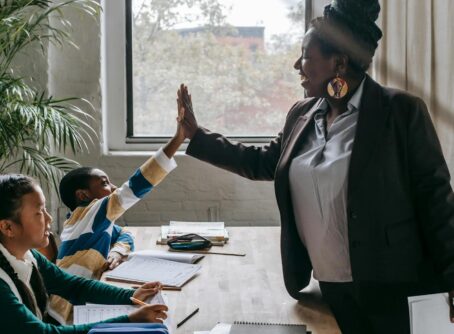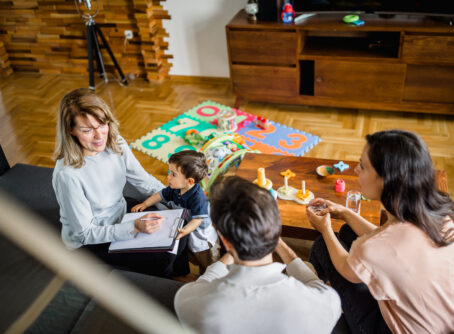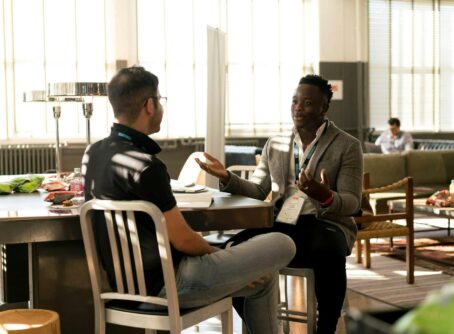
“The collective vibe is hopelessness.”
That’s what Lillian, a college student in New York, told Teen Vogue about Gen Z’s thoughts on politics and their role in voting. The polls back up her sentiment. A national poll done by the Institute of Politics at Harvard Kennedy School in 2023 projected that only 49% of Gen Z planned to vote in the 2024 presidential election — in the 2020 election, 57% of Gen Z cast votes in the presidential election.
This decline can be chalked up to a variety of factors. For one, Gen Z is not attracted to either of the two frontrunners in the upcoming presidential election. Only 35% of the Gen Z demographic approves of President Biden’s performance, yet they’re not thrilled by the prospect of casting their vote for former President Trump, either. One young woman summed up many others’ sentiments when she shared, “Every four years we’re told to choose the lesser of two evils and things will get better…and it just doesn’t get better.”
This points to another element of Gen Z’s declining interest in voting: their low trust in elected leaders. Two in three young people disagreed with the statement “political leaders could generally be trusted when you were growing up.” At the same time, recent data from Tufts shows that Gen Z voted at higher rates in their first midterm election than previous generations did at the same age. This seems to confirm that while Gen Z is politically engaged, Gen Z voters on both sides of the political spectrum feel cynical about our current elected leaders, and tend to think that the Republican Party and the Democratic Party don’t have young peoples’ best interests in mind. Much of Gen Z feels deeply passionate about social issues such as climate change, abortion, and gun control. However, they sense that their vote doesn’t make much of a difference, and that politicians are glad to court their votes without actually being responsible for policy positions that young people care most about. Some young people just say they’d rather not vote at all than vote for a candidate who supports a position they find morally compromising.
Much of Gen Z’s concern for social issues was likely shaped by their coming-of-age amidst a global pandemic, rising inflation, accelerating climate change, ever-isolating digital media, many school shootings, and increased political polarization (just a name a few). About 70% of Gen Z says that the government should be doing something to solve these problems. However, Gen Z has felt profoundly disappointed in the government’s responses to the many tragedies and crises America has faced even in the past four years.
“Can I Really Make a Difference?”
Given the tumultuous years that we’ve lived through as a peer group, it’s no surprise that we Gen Z-ers are feeling deeply discouraged, cynical, and disillusioned by our political system. Politics promises that it can help make the change we so desperately want to see in our world — but it has failed to live up to its word. We’re a generation of advocates who feel like our advocacy has not led to the change we seek.
We’re a generation of advocates who feel like our advocacy has not led to the change we seek.
There’s a temptation to make politics notice us by not voting. Some Gen Z-ers believe that their silence could impact the outcome of the 2024 presidential election, and then the rest of the country might take note of collective dissatisfaction. Dace Potas, in an article for USA Today, expanded on this sentiment. He said, “Rather than choose to vote for someone I think is entirely unfit for office, I would prefer to use my vote to tell the major political parties that they have failed.” There’s also an element of fatigue at play as well, with many disengaging and opting out of what they see as an emotional, unsatisfying, vitriolic political cycle.
As mainstream media and political pundits observe this Gen Z voting trend ahead of the 2024 presidential election, they raise their voices urgently to comment and complain. Some political pundits and opinion writers are frustrated that Gen Z would choose silence instead of voting to support social change and justice causes that they care so much about. Others (excitedly or worriedly) warn that Gen Z’s electoral participation could dramatically shift the results of the upcoming election. Many are also simply offended that young people would abdicate their civic responsibility by not exercising their right to vote. None of these perspectives, though, addresses the disillusionment that characterizes Gen Z’s attitude towards politics. Instead, these arguments only serve to lay guilt on young people’s heads while reinforcing the perception that voting is all about who wins and who loses.
A Public Justice Framework
As a member of Gen Z, I get it. Many times, I also feel the discouragement and hopelessness of this current presidential election. I’ve been hurt by the divisions that previous elections caused in my communities, and I don’t want to go through that pain again. Even so, I’ve been deeply encouraged by rethinking my approach to voting.
If we see voting primarily as a right to be exercised, then we can opt in or out of the process as our feelings about the political system ebb and flow. In his book The Spirit of Our Politics, Michael Wear argues that voting then becomes primarily a venue of expression for our own identity, preferences and causes. Wear says that when voting is centered on our own self-representation, we feel freedom to choose not to vote when to do so would conflict with our idea of self.
Voting, however, does not just impact my identity and my life. When we vote, it shapes the lives of our families, our neighbors and our communities.
Voting, however, does not just impact my identity and my life. When we vote, it shapes the lives of our families, our neighbors and our communities. Voting has consequences for those in our cities who are hungry, unhoused, unable to pay medical bills, or unemployed. It impacts the education children get. It affects the cost of living in your city. It influences interest rates on home, auto and student loans, too.
Jesus instructed his disciples: “Love your neighbor as yourself” (Mark 12:31). We, as disciples of Jesus, care about voting because we care about how voting impacts our neighbors. The Center for Public Justice’s Guidelines on Citizenship states that “Citizens share with governments the responsibility to uphold a just political community.” This perspective supposes that political action (in our case, voting) is not primarily about our individual self-expression, but rather about the collective care of the society we inhabit together. Caring for and serving others is a core tenet of the Christian life. When we view voting as an act of responsibility in caring for our neighbors and community, we bring the beauty and justice our faith offers as a hopeful light to our political square.
Christian faith sees political action (in this case, voting) as service for our neighbors’ good, as opposed to seeking personal fulfillment and validation through the vote. As Christians, we are free to serve our neighbors with our vote precisely because our need for identity and security is met in Christ alone. Furthermore, the more we view voting through the lens of humble Christian service, the more we might see that voting is just the beginning of our civic engagement. Wear continues, “Perhaps if we treated political life as a limited but vital area of responsibility for citizens that derives its importance not from how it makes us feel but from the dignity of the people who are affected by political decisions; perhaps then we’d see more people who are willing not just to vote but also to participate in politics in an others-centered way.”
Our faithful presence as a citizens focused on service is a powerful witness to our neighbors (Christian and non-Christian alike).
Our faithful presence as a citizens focused on service is a powerful witness to our neighbors (Christian and non-Christian alike). The more that our community sees and receives humble service through civic action, the more it can further motivate others to use their vote as an expression of care for each other, creating greater energy toward mutual care throughout your community. Voting with our neighbors in mind is a calling not just for Christians, but for everyone.
There are many ways to serve your community’s civic life beyond voting. Mainstream media make a big show of national elections, but many of the decisions that have tangible impacts on those in your community are made at the local level. Gen Z has a unique perspective on the candidates and issues of contemporary politics. There are many ways to get involved now.
- Identify local, congressional, and state elections around you and can volunteer with political campaigns and promote candidates whom you believe most faithfully reflect the political leadership you desire to see in office.
- Address the issues that both local and national political bodies are deliberating by cultivating an intentional awareness of the news by striving to thoughtfully reflect rather than mindlessly consume.
- Attend town halls in your locality to learn about the pressing questions community members and local governments are considering.
- Identify who your local political leaders are in your locality in order to advocate for specific issues.
- Bring together neighbors to discuss not just the national headlines, but the state of your local economy, school system, or infrastructure.
These are only a few ideas of what loving others through civic engagement might look like. One way to thoughtfully steward your political responsibility before it’s time to fill out a ballot is to use CPJ’s Political Discipleship curriculum as a guide for political engagement with a small group of friends or neighbors.. Shared Justice also has many resources for engaging with specific issues in your local town, city, or county. And as you go out into your community, remember that, as C.S. Lewis wrote, the good news of God’s kingdom is that it is “for all people at all times” — including this one we live in right now. By showing up to the polls and in our communities despite disillusionment and discouragement, Gen Z has an opportunity to model to our communities a hopeful, others-centered vision for our communal life. Gen Z’s vote shows our neighbors that even in the ups and downs of politics, we’re committed to serving and seeing each other through.
Madeline Pannell is the Shared Justice Fellow at the Center for Public Justice. She is part of the Capital Fellows Program in McLean, VA, and recently graduated from the University of Virginia with a B.A. in East Asian Studies. Prior to her work at CPJ, she worked for the Center for Digital Editing at UVA, developing innovative digital-historical projects.






